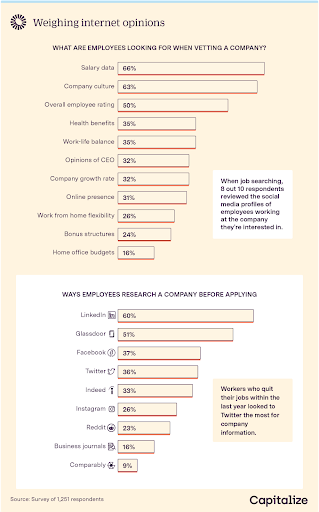- With the Great Resignation in full swing and millions of people looking to switch jobs, employee reviews have never been so important.
- Many people looking for a new job are seeking out employee reviews for validation and reassurance.
- Approximately half of employees read a company’s rating before they apply for a role, and 48% will withdraw their application in reaction to a negative rating.
Are negative reviews harming your ability to recruit staff?
Earlier this month, Allwork.Space wrote about how the majority of Amercians are looking for a new job, in what has been coined the “Great Resignation.”
Insufficient time off, uncompetitive salaries and lack of flexibility are just a handful of factors driving the 61% of US workers who are looking for a new role (or are planning to soon).
With the Great Resignation in full swing and millions of people looking to switch jobs, employee reviews have never been so important.
Over the last couple of years, people have been reimagining what they want from life and work. Many people looking for a new job don’t want to “go from bad to worse” and are seeking out employee reviews for validation and reassurance.
Approximately half of employees read a company’s rating before they apply for a role, and 48% will withdraw their application in reaction to a negative rating.
This is evidenced in a recent report by the fintech firm, Capitalize.
Capitalize’s report focuses on the importance of company reviews in the job seeking process, and is the result of a survey of 1,251 workers ranging in age from 21 to 72. 16% of respondents had quit their job within the last year.
The impact of employee offboarding on reviews
We are all familiar with the importance of first impressions in business, but we tend to overlook the significance of last impressions.
When an employee leaves a firm, they can become an advocate…or an antagonist. A carefully considered offboarding process can help create more advocates.
According to the report, making a good “last impression” on departing employees can have a huge impact on how they review your workplace online afterwards.
54% of respondents who had left a job wrote a review. But employees who were “offboarded” were twice as likely to leave a good company review.
Despite the positive impact of offboarding on reviews – and in turn, future applications – 1 in 10 respondents who had quit a job were not offered offboarding.
Offboarding discussions can cover a range of topics, from employee feedback to planning for the future through the transfer of 401(k) or retirement accounts.
An exit interview can help diffuse any misunderstandings and provide opportunities for growth. It can also leave the door open for future collaboration, making the departing employee more likely to return to the company later, bringing more skills and experience with them.
Tips for an effective exit interview
The exit interview plays an important role in the offboarding process. It can provide the employee with a sense of closure and the employer with actionable information for improving the experience for everyone working in the company. Here are a few tips for employers:
- Say thank you – take the time to reflect on the employee’s achievements and what they have contributed to your organisation during their employment.
- Time it appropriately – Conduct the exit interview in your employee’s last week at your firm, and consider getting a third party (ie. not the manager) to facilitate it.
- Welcome honest feedback – Ask open questions, such as: How could we improve? What should we do differently? Did we provide you with the skills and resources you needed?
- Act on feedback – Share valuable learnings with the rest of your team and be prepared to act on any feedback you receive. Doing so will help you retain your talent.
- Stay in touch – If appropriate, stay connected with your ex-employees and tell them that they are welcome to apply for future roles within your organisation.

Applicants are leaving no stone unturned…
So where are job hunters looking for information, and what do they want to know?
According to Capitalize’s research, over half of workers went to LinkedIn or Glassdoor for first hand accounts of an organisation. A third or more referred to Indeed, Facebook or Twitter, looking at former employee’s accounts as well as the employers’ own social media pages.
In terms of what applicants are looking out for, salary tops the list.
At a time when remote and hybrid working are entering the mainstream, “company culture” comes in as a close second applicant priority. “Work from home flexibility” ranks lower down the list, which may come as a surprise to some employers.

Finally, what would prompt a prospect to think twice about applying to an organisation?
Red flags include a lower-than-average salary (70%), burnout culture (66%), poor leadership or management (66%), a negative overall company rating (64%), mentions of company misconduct (62%), evidence of deleted reviews (61%) and low CEO approval ratings (52%).
Tips for dealing with negative employee reviews
Try not to be tempted to ignore or delete negative reviews. Dealing with them shows potential applicants that you are transparent and value employee feedback. A bad employee review stings, but here are a few ways to mitigate them:
- Create a review response team – Who will respond to reviews? Think about who has the capacity to respond and how you will approach formulating the response together.
- Respond to positive and negative reviews – Potential employees will be looking closely at the reviews themselves but also how you respond to them. Responding provides you with the opportunity to have your voice and showcase your brand values.
- Consider your audience – Although the primary audience of your reply is the person who left the review, consider how your secondary audiences will perceive your response, including applicants, existing staff, investors and other stakeholders.
- Ask employees to leave reviews – Ask employees to leave honest reviews. Encouraging authenticity is a positive thing and could lead to more goodwill.
- See reviews as a vehicle for change – Reviews might lead you to uncover underlying issues. See reviews as a learning opportunity, have internal conversations, and take steps to rectify any problems that arise. People want to work for a company that listens and responds.















